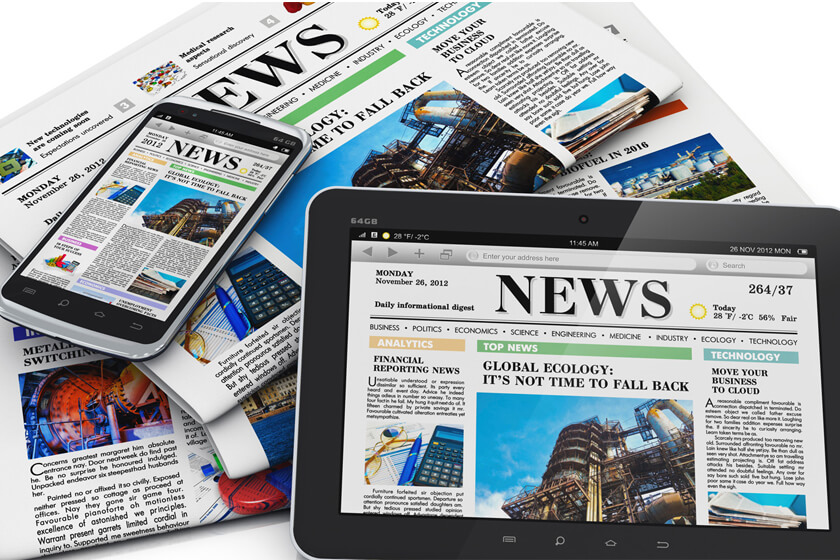West Long Branch, NJ – Fully 8-in-10 Americans agree that Donald Trump has had a worse relationship with the media than his predecessors, with most saying this is hurting both his image and the media’s image as well. When the Monmouth University Poll pitted the president against three major television news outlets, Trump was found to be less trustworthy in each instance. The poll also found that most Americans believe that news outlets – from traditional media entities to newer online sources – report “fake news” stories at least occasionally.
Currently, 81% of the public believe Donald Trump has a worse relationship with the media than past presidents had. Just 4% say his relationship is better and 12% say it is about the same. A majority of Americans (58%) say the current state of this relationship has hurt’s Trump image. Just 7% say Trump’s image has been helped by the way this relationship has played out and 32% say it has not affected his image either way. By the same token, just over half (51%) say the current state of this relationship has hurt the media’s image. Just 6% say the media’s image has been helped by the way they engage with the president and 39% say their relationship with Trump has not affected the media’s image either way.
“It is an understatement to say the new administration’s relationship with the fourth estate cannot be characterized as friendly or even respectful. This ugliness has hurt each side’s reputation,” said Patrick Murray, director of the independent Monmouth University Polling Institute in West Long Branch, New Jersey.
A number of polls have compared public trust of the president and the media. The Monmouth University Poll took a different approach by pitting Pres. Trump directly against three individual outlets that received the highest and lowest credibility ratings among television news sources in a recent Morning Consult poll. Trump is trusted less than each of these three outlets, from the one seen as most credible – ABC News – to those perceived as least credible – Fox News and MSNBC.
Only 28% of Americans are more likely trust Trump as an information source compared to ABC news while most (53%) say they would tend to trust ABC more, with 15% saying they would trust both sides equally. When pitted against MSNBC, 33% trust Trump more while 47% trust the liberal leaning cable channel more, with 15% trusting both about equally. When pitted against Fox News, only 17% trust Trump more while 37% trust the politically conservative news outlet more, with 36% trusting both about equally.
The story is different, though, when isolating the views of Republicans. Americans who identify as GOP partisans are more likely to have confidence in Trump over any of the news sources tested in the poll. This is especially true for MSNBC – Trump is more trusted by a 66% to 16% margin – and ABC News – Trump is more trusted by a 56% to 22% margin. The president even has a slight, although statistically insignificant, 29% to 26% trust advantage over Fox News among his fellow partisans, with 44% of Republicans saying they trust both equally as an information source.
“If you are a Republican, Trump is a font of truth. For other Americans, not so much,” said Murray.
The poll also tested the three media sources against one another and found that ABC is more trusted than either Fox (44% to 32%) or MSNBC (36% to 18%). Fox and MSNBC are tied (39% to 39%) when they are pitted against one another on the trust metric. Not surprisingly, Republicans trust Fox (67%) more than MSNBC (10%) while Democrats trust MSNBC (67%) more than Fox (19%) by a similar margin. However, while Republicans put more credence in information they get from Fox (65%) over ABC (16%), Democrats actually give ABC (41%) the edge over MSNBC (25%) when it comes to trust in the information each news outlet provides.
“Trust in the media is really dependent on the source. It is interesting that Democrats are more likely to give a credibility edge to an outlet that is seen as more mainstream over one whose political perspective is more in line with their own. Most Republicans, on the other hand, seem to assume that every source that isn’t conservative must, by definition, have a liberal bias and is therefore less trustworthy. There doesn’t seem to be a middle ground for them,” said Murray.
More than 6-in-10 Americans believe that traditional major TV and newspaper media outlets report “fake news,” including 27% who believe this happens regularly and 36% who say it happens occasionally. An even larger majority believe that online news websites report fake news, including 41% who believe this happens regularly and 39% who say it happens occasionally. Republicans (79%) and independents (66%) are more likely than Democrats (43%) to say that major media outlets transmit fake news stories. The difference is less stark for online news sites – 87% of Republicans, 83% of independents, and 72% of Democrats say these sources circulate fake news.
A majority of Americans (54%) believe that online news websites report fake stories on purpose in order to push an agenda. Only 17% believe that online sites tend to report these stories only by accident or due to poor fact checking. Another 6% feel they do both equally and the remainder are either not sure or do not feel that fake news is reported by online sites. Majorities of Republicans (57%), independents (57%), and Democrats (52%) alike feel that online news sites intentionally disseminate fake news.
About 4-in-10 Americans (39%) say that traditional news media sources report fake news as a way to push an agenda. Another 17% believe that major media tends to report these stories accidentally, 6% feel both reasons are equally prevalent, and the remainder are either not sure or do not feel that fake news is reported by traditional media outlets. Republicans (55%) and independents (41%) are more likely than Democrats (24%) to say that major media sources deliberately share fake news.
“Many Americans believe that fake news is rampant across all types of media. The main outcome of this phenomenon seems to be that all news media outlets are now eyed with suspicion,” said Murray.
The Monmouth University Poll was conducted by telephone from March 2 to 5, 2017 with 801 adults in the United States. The results in this release have a margin of error of +/- 3.5 percent. The poll was conducted by the Monmouth University Polling Institute in West Long Branch, NJ.
QUESTIONS AND RESULTS
(* Some columns may not add to 100% due to rounding.)
[Q1-38 previously released.]
I have just a few questions about news sources before we end…
39. Compared to other administrations, do Donald Trump and the news media have a better relationship, worse relationship, or about the same relationship as past presidents?
| March 2017 | |
| Better | 4% |
| Worse | 81% |
| About the same | 12% |
| (VOL) Don’t know | 3% |
| (n) | (801) |
[QUESTIONS 40 & 41 WERE ROTATED]
40. Does the current relationship between Trump and the news media do more to help or hurt Trump’s image, or does it not really affect his image either way?
| March 2017 | |
| Help | 7% |
| Hurt | 58% |
| Not affect either way | 32% |
| (VOL) Don’t know | 3% |
| (n) | (801) |
41. Does the current relationship between Trump and the news media do more to help or hurt the news media’s image, or does it not really affect their image either way?
| March 2017 | |
| Help | 6% |
| Hurt | 51% |
| Not affect either way | 39% |
| (VOL) Don’t know | 4% |
| (n) | (801) |
[QUESTIONS 42 THROUGH 47 WERE ROTATED]
I’m going to read you some names of information sources. For each pair of names I read, please tell me which one you trust more as a source of information, or whether you trust both sources about equally. First, [READ PAIR]
42. Donald Trump and ABC News
| March 2017 | |
| Trust Trump more | 28% |
| Trust ABC News more | 53% |
| Trust both equally | 15% |
| (VOL) Don’t know | 5% |
| (n) | (801) |
43. Donald Trump and Fox News
| March 2017 | |
| Trust Trump more | 17% |
| Trust Fox News more | 37% |
| Trust both equally | 36% |
| (VOL) Don’t know | 10% |
| (n) | (801) |
44. Donald Trump and MSNBC
| March 2017 | |
| Trust Trump more | 33% |
| Trust MSNBC more | 47% |
| Trust both equally | 15% |
| (VOL) Don’t know | 5% |
| (n) | (801) |
45. ABC News and Fox News
| March 2017 | |
| Trust ABC News more | 44% |
| Trust Fox News more | 32% |
| Trust both equally | 20% |
| (VOL) Don’t know | 4% |
| (n) | (801) |
46. ABC News and MSNBC
| March 2017 | |
| Trust ABC News more | 36% |
| Trust MSNBC more | 18% |
| Trust both equally | 36% |
| (VOL) Don’t know | 10% |
| (n) | (801) |
47. Fox News and MSNBC
| March 2017 | |
| Trust Fox News more | 39% |
| Trust MSNBC more | 39% |
| Trust both equally | 19% |
| (VOL) Don’t know | 4% |
| (n) | (801) |
[QUESTIONS 48-50 WERE ROTATED WITH QUESTIONS 51-53]
48. Do you think some traditional major news sources like TV and newspapers ever report fake news stories, or not? [If YES: Do they do this regularly or just occasionally?]
| March 2017 | |
| Yes, regularly | 27% |
| Yes, occasionally | 36% |
| No, do not | 32% |
| (VOL) Don’t know | 6% |
| (n) | (801) |
49. [SKIPPED]
50. Do you think these sources report these stories on purpose in order to push an agenda or do they tend to report them more by accident or because of poor fact checking?
| March 2017 | |
| On purpose in order to push an agenda | 39% |
| By accident or because of poor fact checking | 17% |
| (VOL) Both equally | 6% |
| (VOL) Don’t know | 1% |
| Major media do not report fake news (Q48) | 32% |
| Unsure if major media report fake news (Q48) | 6% |
| (n) | (801) |
51. Do you think some online news websites ever report fake news stories, or not? [If YES: Do they do this regularly or just occasionally?]
| March 2017 | |
| Yes, regularly | 41% |
| Yes, occasionally | 39% |
| No, do not | 11% |
| (VOL) Don’t know | 9% |
| (n) | (801) |
52. [SKIPPED]
53. Do you think these websites report these stories on purpose in order to push an agenda or do they tend to report them more by accident or because of poor fact checking?
| March 2017 | |
| On purpose to push an agenda | 54% |
| By accident or poor fact checking | 17% |
| (VOL) Both equally | 6% |
| (VOL) Don’t know | 2% |
| Online outlets do not report fake news (Q51) | 11% |
| Unsure if online outlets report fake news (Q51) | 9% |
| (n) | (801) |
METHODOLOGY
The Monmouth University Poll was sponsored and conducted by the Monmouth University Polling Institute from March 2 to 5, 2017 with a national random sample of 801 adults age 18 and older, in English. This includes 401 contacted by a live interviewer on a landline telephone and 400 contacted by a live interviewer on a cell phone. Telephone numbers were selected through random digit dialing and landline respondents were selected with a modified Troldahl-Carter youngest adult household screen. Monmouth is responsible for all aspects of the survey design, data weighting and analysis. Final sample is weighted for region, age, education, gender and race based on US Census information. Data collection support provided by Braun Research (field) and SSI (RDD sample). For results based on this sample, one can say with 95% confidence that the error attributable to sampling has a maximum margin of plus or minus 3.5 percentage points (unadjusted for sample design). Sampling error can be larger for sub-groups (see table below). In addition to sampling error, one should bear in mind that question wording and practical difficulties in conducting surveys can introduce error or bias into the findings of opinion polls.
| DEMOGRAPHICS (weighted) |
| Self-Reported |
| 26% Republican |
| 43% Independent |
| 31% Democrat |
| 49% Male |
| 51% Female |
| 32% 18-34 |
| 36% 35-54 |
| 32% 55+ |
| 66% White |
| 12% Black |
| 15% Hispanic |
| 7% Asian/Other |
Click on pdf file link below for full methodology and results by key demographic groups.




